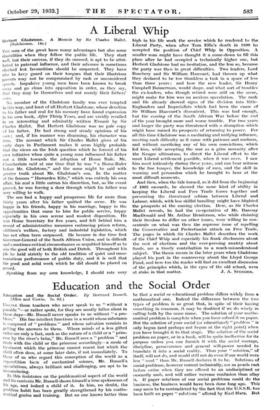A Liberal Whip
Herbert Gladstone. A Memoir by Sir Charles Mallet. (Hutchinson. 18s.)
'flue sons of the great have many advantages but also some disabilities when they follow the public life. They start well, but their success, if they do succeed, is apt to be attri- buted to paternal influence, and their advance is sometimes checked lest favouritism should be suspected. They have also to keep guard on their tongues that their illustrious parents may not be compromised by rash or unconsidered speech. Impulsive young men have been known to break away and go clean into opposition in order, as they say, that they may be themselves and not merely their fathers' bons.
No member of the Gladstone family was ever tempted in this way, and least of all Herbert Gladstone, whose devotion to his father and zeal for his memory have found expression in his own book, After Thirty Years, and are vividly recalled in an interesting and admirably written Memoir by Sir Charles Mallet. But Herbert Gladstone was no pale copy of his father. He had strong and steady opinions of his own ; and, if his manner was disarming, his character was firm. The account which Sir Charles Mallet gives of his early days in Parliament makes it seem highly probable that the views on the Irish question which he formed of his own initiative when quite a young man influenced his father not a little towards the adoption of Home Rule. Mr. Chamberlain said at one time that he was " a Home-Ruler before Mr. Gladstone," and the same might be said with greater truth about Mr. Gladstone's son. In the matter of the famous " Hawanlen Kite," which was entirely his own affair, his zeal a little outran his discretion, but, as the event proved, he was forcing a door through which his father was very willing to walk.
The son had a happy and prosperous life for more than thirty years after his father quitted the scene. He was happy in his friends, happy in his marriage, happy in the opportunities that came to him for public service, happy especially in his own serene and modest disposition. He was Home Secretary for five years, and left behind him a record of administrative measures embracing prison reform, children's welfare, factory and industrial legislation, which has not often been surpassed. He became in due time first Governor-General of the South African Union, and in difficult and sometimes critical circumstances so acquitted himself as to win the good will of both British and Dutch. Throughout his life he held strictly to the old tradition of quiet and unos- tentatious performance of public duty, and it is well that the good and solid work which he did should be placed on record.
Speaking from my own knowledge, I should rate very
high in his life work the service which he rendered to the Liberal Party, when after Tom Ellis's death In 1899 he accepted the position of Chief Whip in Opposition. A smaller man might have thought it a come-down to fill this place after he had occupied a technically higher one, but Herbert Gladstone had no hesitation, and the less so, because the party was then in great difficulties. Two leaders, Lord Rosebery and Sir William Harcourt, had thrown up what they declared to be too thankless a task in a space of less than three years ; and how the new leader, Sir Henry Campbell Bannerman, would shape, and what sort of troubles the ex-leaders, who though retired were still on the scene, might make for him was an anxious speculation. The rank and file already showed signs of the division into little- Englanders and Imperialists which had been the cause of Sir William Harcourt's discontent. This was bad enough, but the coming of the South African War before the end of the year brought more and worse trouble. For two years and longer the party was threatened with n disruption which might have ruined its prospects of returning to power. For all this time Gladstone was a mediating and unifying influence, meeting each difficulty as it came with patience and coolness, and without sacrificing any of his own convictions, which led him, while accepting the war as a grim necessity after the Kruger ultimatum, to direct the Liberal effort to the most Liberal settlement possible, when it was over. I saw him most intimately during these years, and can bear witness to the fine temper, the knowledge of men, and the skill in warning and persuasion which he brought to bear at the most difficult moments.
And then, when the tide turned, as it did from the beginning of 1903 onwards, he showed the same kind of ability in keeping the Liberal and Free Trade forces together and preventing the threatened schism between Liberal and Labour, which, with less skilful handling might have blighted the prospects at the coming election. Here, as Sir Charles Mallet reveals, he had the co-operation of Mr. Ramsay MacDonald and Mr. Arthur Henderson, who while claiming their freedom to differ on other issues, were willing to con- centrate on what was then the supreme issue of repelling the Conservative and Protectionist attack on Free Trade. The pages in which Sir Charles Mallet describes the work of the Chief Whip and especially his frank disclosures about the cost of elections and the ever-pressing anxiety about funds, are a timely contribution to a much-misunderstood subject. The theme recurs in the later years when Gladstone played his part in the controversy about the Lloyd George Fund, and here too the reader will find an excellent discussion of the principles which, in the eyes of the old school, were












































 Previous page
Previous page